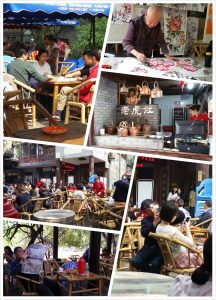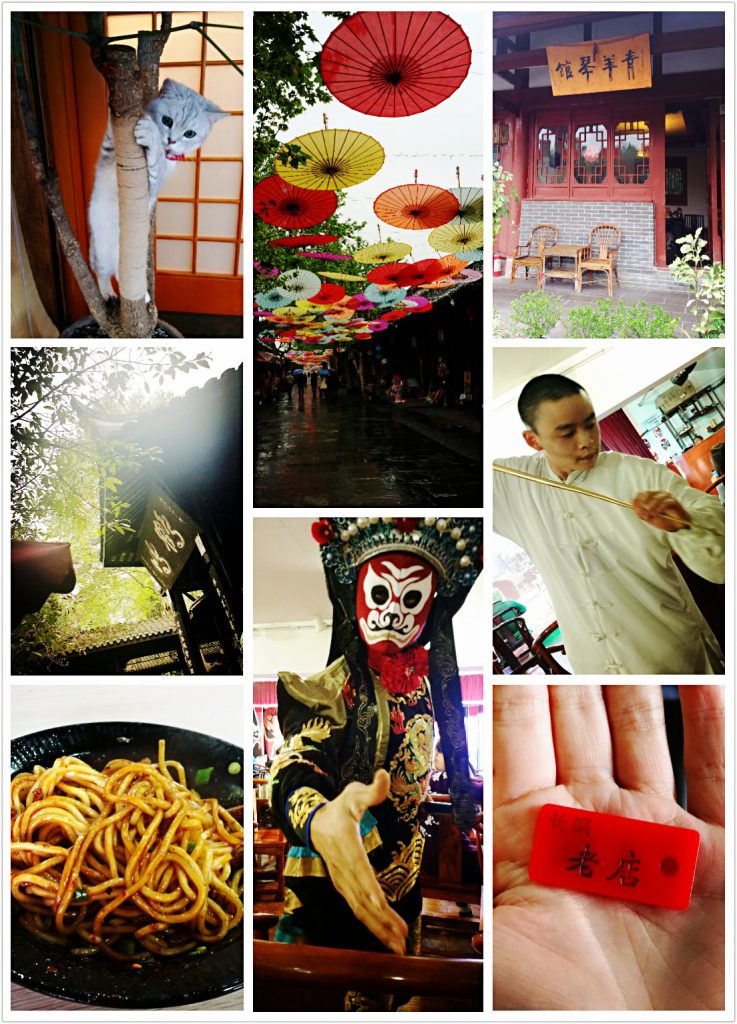Unlike other mega-cities throughout China, Sichuan’s provincial capital of Chengdu is renowned for its laid-back atmosphere. Relaxation is the order of the day, and the locals have become experts at it. In fact, the city boasts more tea houses and bars than Shanghai, in spite of having less than half the population! With its numerous public parks, active nightlife, and tranquil tea culture, Chengdu is the ideal place to soak in the true essence of China at a leisurely pace.
The city itself is located on the fertile Chengdu Plain, which is nicknamed the “Country of Heaven” or the “Land of Abundance” thanks to its unparalleled agricultural potential. This is in part due to the ancient Dujiangyan Irrigation System, which rests about 58 kilometres (36 mi) from the city and is the oldest of its kind in the world. This impressive project has been diverting water from the Min River to the plain for over 2,000 years and was designated a UNESCO World Heritage Site in 2000, along with nearby Mount Qingcheng.
Yet it seems the city might be even older than this water system suggests! Although records indicate that the original city of Chengdu was founded during the Qin Dynasty (221-206 BC), archaeological discoveries at the nearby Jinsha Site and Sanxingdui Site have shown that the region was settled over 4,000 years ago. Artefacts from this extraordinary discovery can now be found in the Jinsha Relics Museum and the Sanxingdui Museum, which are located in the northwest of Chengdu and at the Sanxingdui Site respectively. From then onwards, it became the capital of two short-lived regimes: the Former Shu (907-925) and the Later Shu (934-965). During that time, its economic prosperity skyrocketed and, during the Song Dynasty (960-1279), it became one of the first places in the world where paper money was widely circulated.
Its venerable history means that Chengdu boasts a myriad of exciting historical monuments, such as the cottage of the Tang Dynasty (618-907) poet Du Fu and the Wuhou Temple. Du Fu, who is considered one of the greatest poets in Chinese history, took refuge in Chengdu after he fled the imperial capital of Chang’an (modern-day Xi’an). He wrote over 240 celebrated poems while he was there and, during the second year of his stay, he constructed his “caotang” or “thatched cottage”. However, the cottage that you see today was actually constructed in 1078 as a memorial to Du Fu, and is far more luxurious than the original. What a shame he didn’t live to enjoy it!
Similarly, the Wuhou Temple was built during the Western Jin Dynasty (265–316) in honour of Zhuge Liang, a legendary military and political strategist who served the Shu-Han Dynasty (221–263) during the turbulent Three Kingdoms Period (220-280). Nowadays it functions as a museum and contains a collection of statues, stone inscriptions, and tablets that provide a small window into China’s ancient past.
Alongside these historical relics, Chengdu also boasts arguably the greatest and most well-known national treasure of all: the giant panda. Sichuan province is home to the vast majority of the world’s giant panda population, and its provincial capital acts as the perfect gateway to many of its finest panda reserves. These conservation projects are so integral to the survival of this gentle giant that they were collectively designated a UNESCO World Heritage Site in 2006.
 Within the city itself, you’ll find the Chengdu Panda Research Base, which is located in its northern suburbs. It’s a breeding centre for giant pandas, but also acts as a zoo where visitors can watch the pandas in their specialised enclosures, keep up-to-date on the latest conservation projects, and learn more about this cuddly creature. It seems befitting that the animal associated with Chengdu should be one that’s known for its love of eating, sleeping, and enjoying a leisurely life!
Within the city itself, you’ll find the Chengdu Panda Research Base, which is located in its northern suburbs. It’s a breeding centre for giant pandas, but also acts as a zoo where visitors can watch the pandas in their specialised enclosures, keep up-to-date on the latest conservation projects, and learn more about this cuddly creature. It seems befitting that the animal associated with Chengdu should be one that’s known for its love of eating, sleeping, and enjoying a leisurely life!
While the city’s pandas spend their days munching on bamboo, the locals prefer to sip on jasmine tea at one of the hundreds of tea houses found throughout the city. Bamboo chairs and wooden tables are the hallmark of a traditional tea house, while modern tea houses boast a diverse range of styles. Alongside tea and snacks, most tea houses offer Majiang sets, Majiang tables, or even separate Majiang rooms. So forget about your poker face; in Chengdu, you’ll have to don your Majiang mask! Luxury tea houses will usually offer some kind of live entertainment, such as thrilling daily performances of Sichuan opera.
Yet your thirst isn’t the only desire that is sure to be quenched. Chengdu is widely acknowledged as one of China’s centres of gastronomy. Sichuan-style cuisine is celebrated as one of the Eight Great Culinary Traditions of Chinese Cooking, and its capital is home to some of the finest restaurants in the province. In particular, Jinli Ancient Street boasts a plethora of old-fashioned stores, boutique hotels, luxury restaurants, and vibrant bars that are sure to delight the eyes and the palate. This is the ideal place to sample some of the local snack food, or indulge in a banquet of local delicacies. Just be sure to keep a cup of tea on-hand; Sichuan-style food is notoriously spicy!

One Reply to “Chengdu”
Comments are closed.